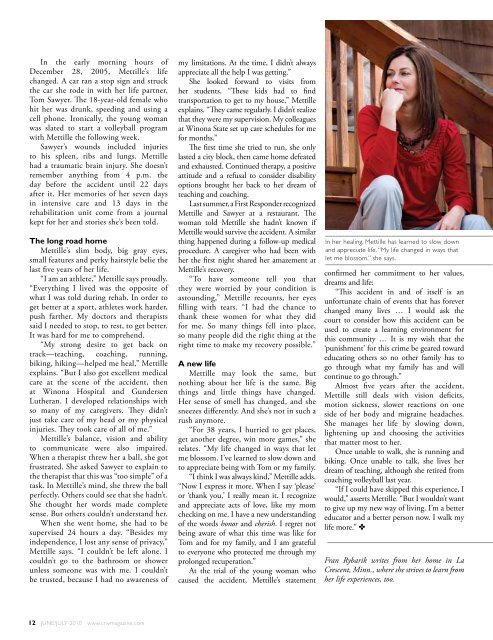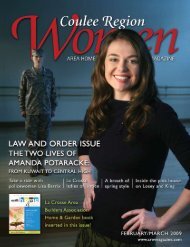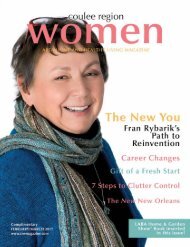June/July 2010 - Coulee Region Women's Magazine
June/July 2010 - Coulee Region Women's Magazine
June/July 2010 - Coulee Region Women's Magazine
- No tags were found...
Create successful ePaper yourself
Turn your PDF publications into a flip-book with our unique Google optimized e-Paper software.
In the early morning hours ofDecember 28, 2005, Mettille’s lifechanged. A car ran a stop sign and struckthe car she rode in with her life partner,Tom Sawyer. The 18-year-old female whohit her was drunk, speeding and using acell phone. Ironically, the young womanwas slated to start a volleyball programwith Mettille the following week.Sawyer’s wounds included injuriesto his spleen, ribs and lungs. Mettillehad a traumatic brain injury. She doesn’tremember anything from 4 p.m. theday before the accident until 22 daysafter it. Her memories of her seven daysin intensive care and 13 days in therehabilitation unit come from a journalkept for her and stories she’s been told.The long road homeMettille’s slim body, big gray eyes,small features and perky hairstyle belie thelast five years of her life.“I am an athlete,” Mettille says proudly.“Everything I lived was the opposite ofwhat I was told during rehab. In order toget better at a sport, athletes work harder,push farther. My doctors and therapistssaid I needed to stop, to rest, to get better.It was hard for me to comprehend.“My strong desire to get back ontrack—teaching, coaching, running,biking, hiking—helped me heal,” Mettilleexplains. “But I also got excellent medicalcare at the scene of the accident, thenat Winona Hospital and GundersenLutheran. I developed relationships withso many of my caregivers. They didn’tjust take care of my head or my physicalinjuries. They took care of all of me.”Mettille’s balance, vision and abilityto communicate were also impaired.When a therapist threw her a ball, she gotfrustrated. She asked Sawyer to explain tothe therapist that this was “too simple” of atask. In Mettille’s mind, she threw the ballperfectly. Others could see that she hadn’t.She thought her words made completesense. But others couldn’t understand her.When she went home, she had to besupervised 24 hours a day. “Besides myindependence, I lost any sense of privacy,”Mettille says. “I couldn’t be left alone. Icouldn’t go to the bathroom or showerunless someone was with me. I couldn’tbe trusted, because I had no awareness ofmy limitations. At the time, I didn’t alwaysappreciate all the help I was getting.”She looked forward to visits fromher students. “These kids had to findtransportation to get to my house,” Mettilleexplains. “They came regularly. I didn’t realizethat they were my supervision. My colleaguesat Winona State set up care schedules for mefor months.”The first time she tried to run, she onlylasted a city block, then came home defeatedand exhausted. Continued therapy, a positiveattitude and a refusal to consider disabilityoptions brought her back to her dream ofteaching and coaching.Last summer, a First Responder recognizedMettille and Sawyer at a restaurant. Thewoman told Mettille she hadn’t known ifMettille would survive the accident. A similarthing happened during a follow-up medicalprocedure. A caregiver who had been withher the first night shared her amazement atMettille’s recovery.“To have someone tell you thatthey were worried by your condition isastounding,” Mettille recounts, her eyesfilling with tears. “I had the chance tothank these women for what they didfor me. So many things fell into place,so many people did the right thing at theright time to make my recovery possible.”A new lifeMettille may look the same, butnothing about her life is the same. Bigthings and little things have changed.Her sense of smell has changed, and shesneezes differently. And she’s not in such arush anymore.“For 38 years, I hurried to get places,get another degree, win more games,” sherelates. “My life changed in ways that letme blossom. I’ve learned to slow down andto appreciate being with Tom or my family.“I think I was always kind,” Mettille adds.“Now I express it more. When I say ‘please’or ‘thank you,’ I really mean it. I recognizeand appreciate acts of love, like my momchecking on me. I have a new understandingof the words honor and cherish. I regret notbeing aware of what this time was like forTom and for my family, and I am gratefulto everyone who protected me through myprolonged recuperation.”At the trial of the young woman whocaused the accident, Mettille’s statementIn her healing, Mettille has learned to slow downand appreciate life. “My life changed in ways thatlet me blossom,” she says.confirmed her commitment to her values,dreams and life:“This accident in and of itself is anunfortunate chain of events that has foreverchanged many lives … I would ask thecourt to consider how this accident can beused to create a learning environment forthis community … It is my wish that the‘punishment’ for this crime be geared towardeducating others so no other family has togo through what my family has and willcontinue to go through.”Almost five years after the accident,Mettille still deals with vision deficits,motion sickness, slower reactions on oneside of her body and migraine headaches.She manages her life by slowing down,lightening up and choosing the activitiesthat matter most to her.Once unable to walk, she is running andbiking. Once unable to talk, she lives herdream of teaching, although she retired fromcoaching volleyball last year.“If I could have skipped this experience, Iwould,” asserts Mettille. “But I wouldn’t wantto give up my new way of living. I’m a bettereducator and a better person now. I walk mylife more.” DFran Rybarik writes from her home in LaCrescent, Minn., where she strives to learn fromher life experiences, too.12 JUNE/JULY <strong>2010</strong> www.crwmagazine.com
















